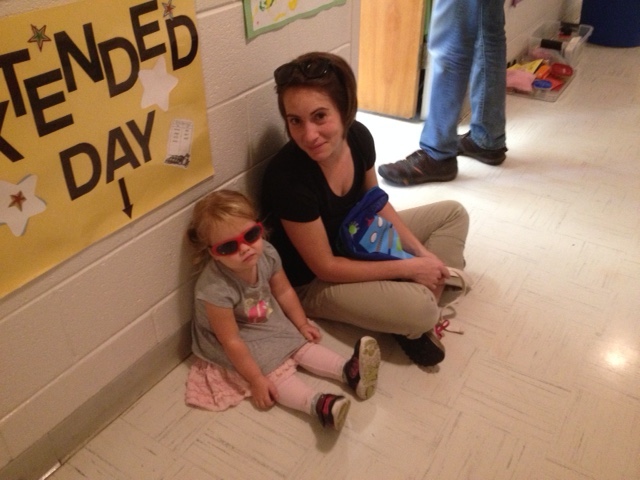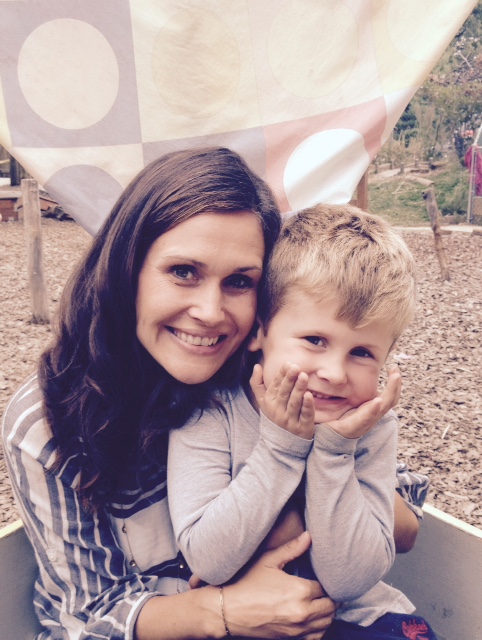The transition from summer to school can be difficult for many children (and parents!), and now that October has begun it’s natural to think that everyone will have adjusted to the new schedule.
Experienced teachers have a warning, however: it’s not uncommon that anxiety at drop-off surfaces after the first month of school. Just when we’ve got the new morning routine down and have affixed labels to everything from lunch boxes to rain boots, our preschooler suddenly decides to put up a fight at drop-off. What happened?
SSDS 2s and 3s teacher Ms. Judy explains that preschoolers, especially those who are attending school for the first time, experience the first few weeks almost as a novelty. When the routine is solidified, however, they internalize the fact that drop-off means saying good-bye.
Author Korin Davis and daughter Faye preparing for drop off outside Ms. Judy’s room. Even with the best laid plans, sometimes drop off can still be a challenge for parents.
Whether your child has been struggling with separation from the start of the school year, or if it is something that has just recently begun, SSDS teachers have a surprisingly simple tool for easing a child’s anxiety: confidence.
“Dropoff always works better when I don’t linger. We do our routine, I give him a big hug and kiss and then I’m out the door. So far, Christian is showing great progress in pre-K, especially for a kid who has always had trouble with transitions and goodbyes. So years of being consistent in your separation process DOES pay off!” ~Meredith Dedolph, mom to Christian in Ms. Kim’s Pre-K & Charlotte, SSDS ’14
We asked teachers for “tips for a successful school transition,” and found that the majority of responses focused on the importance of parents showing confidence. “Remind your child of the drop-off routine in advance and then stick to it with confidence,” wrote 4s teacher Ms. Lesley. “Don’t show any distress if your child is crying or clinging,” suggested 2s and 3s teacher Ms. Judy, “show your child that you are confident.” Ms. Rebecca advises her 2s and 3s parents to “talk about how you trust the teachers that they will love and care for your child while you are away.”
Pre-K teacher Ms. Emily had another simple idea for parents: “Script the goodbye ahead of time. Tell the child what will happen. For example, ‘I’ll bring you to the gate. We’ll put your snack in the bucket. I’ll give you three kisses and say goodbye. You’ll go down to put your backpack on the hook and find a good place to play.’ Then stick to it!” Usually, she said, the child calms down fairly quickly after the parent leaves.
Teachers also suggested that a calm morning can help. They recommended allowing plenty of time to get yourself and your child ready to leave for school – don’t rush. Keep children well fed and well rested, and schedule down time. Offer lots of positive reinforcement and know that the teachers will, too.
And of course, if you are worried your child will have a difficult time settling down, call the office a short time after drop-off and ask them to check with the teacher to see how your child is doing. The answer is almost always, “just fine.”
~By Korin Davis (Mom to Faye, Ms. Judy’s 3’s and Amos, SSDS ’14)
Teacher’s Recommended Books:
Ms. Emily: The Kissing Hand by Audrey Penn
Ms. Lesley: I Don’t Want to Go to School by Nancy Pando, LICSW; For Parents: Helping Your Anxious Child by Ronald Rapee, and Anxiety Free Kids by Bonnie Zucker.
Ms. Kim: Llama Llama Misses Mama by Anna Dewdney
___________________________________________________________________________________________



